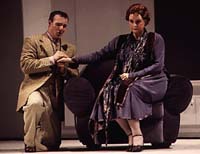
Like most of Richard Strauss’s once-scorned late operas, Intermezzo has been upgraded and is now encountered with some frequency. The City Opera’s engaging new production, another import from Glimmerglass, makes one wonder why it took so long for this sophisticated “domestic comedy” to find an audience. When new in 1924, the opera was dismissed by many as downright tasteless – imagine, a composer putting himself, his wife, and his family onstage, dramatizing a trivial misunderstanding in his own marriage that nearly led to a divorce. But Strauss knew exactly what he was doing (he wrote the text himself), and he needed a change of pace after struggling with such complex operatic fantasies as Die Frau ohne Schatten and Die Ägyptische Helena. Besides, he was eager to experiment with a rapidly paced, conversational text that would give him opportunities to expand on the techniques of fluid musical declamation he had developed in earlier operas.
Above all, though, Strauss wanted to pen a valentine to his wife, Pauline (Christine in the opera). The work is essentially a fascinating character study of this unusual woman – quick-tempered and volatile but, underneath a prickly exterior, deeply devoted to her composer-conductor husband (here named Robert Storch), who apparently adores playing the role of henpecked mate. And how deftly Strauss pulled it off. He succeeded in presenting himself and his waspish wife as a strangely lovable odd couple, basking in a highly charged, mutually stimulating if slightly crazy relationship, one that Freud no doubt would have found highly intriguing, not to say entertaining. The more one sees and hears the opera, the more miraculous it seems, not only for its prosodic brilliance and ravishing instrumental writing but also for the composer’s remarkable ability to view his marriage so objectively and create such lively three-dimensional characters.
Christine has had many wonderful interpreters in recent years. I recall Elisabeth Söderström, Hanny Steffek, Phyllis Curtin, Felicity Lott, and Lucia Popp with pleasure, and now Lauren Flanigan earns a spot in that select pantheon. I’m tempted, in fact, to nominate her Frau Storch as the operatic performance of the season: not only for an extraordinarily nuanced and concentrated dramatic interpretation of a challenging role, but also for the glorious singing of an important soprano now at the peak of her form. Her Christine changes moods at an eyebrow’s flicker, but the edge of this unpredictable woman is softened by the warmth and concern that bubbles up for her husband, even in the most trying situations – no wonder Strauss worshiped her so. Flanigan has a full complement of wonderful colleagues, led by John Hancock, whose suavely sung Storch functions as the still center of his stormy household, and Matthew Chellis, who gives a delicious cameo as Baron Lummer, Christine’s ineffectual protégé.
Intermezzo is one opera that resists updates and fancy directorial concepts – most productions I’ve encountered depict an elaborately furnished twenties Alpine villa in move-in condition. Set designer Andrew Jackness did not quite have the budget for that, but comfortable domesticity is more than adequately suggested, and the rapid shifts in venue – toboggan slide, country inn, notary’s office, etc. – are smoothly, even ingeniously managed. Director Leon Major has invented a small crew of servant extras to help with the set changes, a charming conceit wittily integrated into a staging full of vitality and character. The City Opera orchestra under George Manahan is often hard-pressed to meet Strauss’s virtuoso writing, but at least the instrumental playing is never less than spirited and to the point.